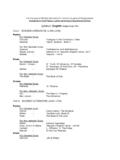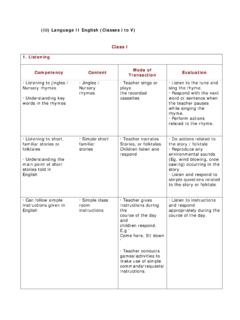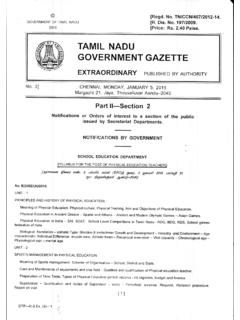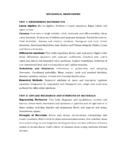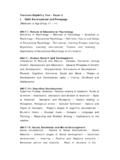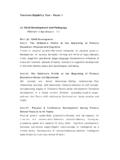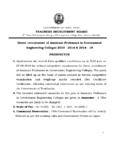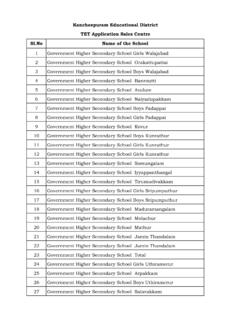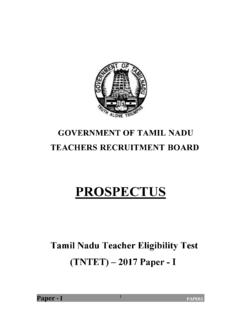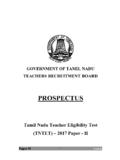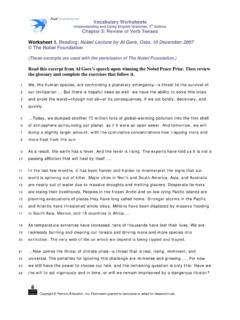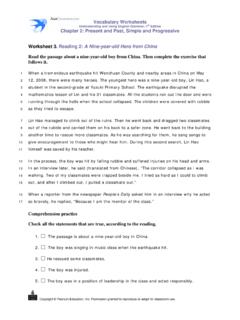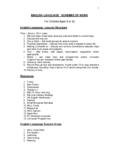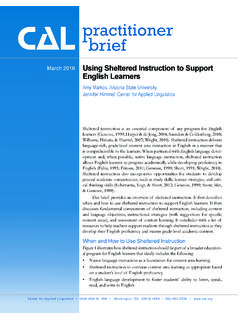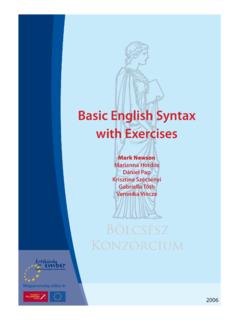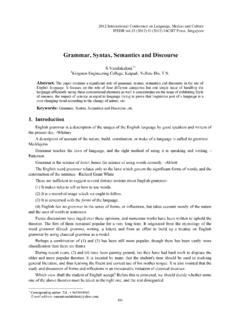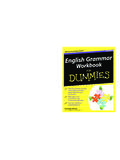Transcription of TET Paper 2 Language 2 English - t n
1 I. Language II English (Classes VI to VIII) (Compulsory) Class VI Listening Competencies Classroom activities and processes Learning Outcomes Evaluation Listening to: Instructions, Imperative Statements Short Stories Short audio pieces (radio play/ chosen parts of CDs/Poetry/ Short passages) Reading aloud stories Reciting poems Giving specific instructions for an activity or class work Playing an audio story (Audio books, audio rendition of poems It will be reiterated at a suitable time in future.)
2 Comprehends oral instructions Learns to pronounce words and phrases Makes meaning of what she listens to and responds appropriately, orally or through written exercises Follow instructions Listen and recite or read with clear intonation and pronunciation Listen and respond orally or through written exercises: Eg; Write or say a line about the characters in a story; give a suitable title Answer objective questions Identifying and discriminating difficult words Dictation: Hearing words, and spelling accurately : gh sounds, silent letters, /s/, /z/, / /, /3/ homophones etc.
3 Learns that spelling and pronunciation are different Learns to spell well as many words as thought appropriate Connects sounds and forms a word picture. Learns New vocabulary Spelling Games Spells words; finds patterns; uses correct spelling in writing Understands meanings of words learnt. Speaking Competencies Classroom activities and processes Learning Outcomes Evaluation Reading aloud from a text Reading aloud from their reader Reads clearly with pauses; pronounces words accurately Read the given passage fluently without erase and with correct pauses.
4 Reciting: reading from text Reciting from memory Learning and reciting in groups, or individually from the selection of specified poems Read in unison, with sense of meter and rhyme Reads alone without stumbling, with expression Expresse appreciation for the poem read; Recite with expression; without faltering Memorise the poem using appropriate greetings for various occasions Making requests Enacting Instructing another classmate Activity: role play, games; other oral activities: Ask Answer activities around familiar situations in day-to-day life Giving directions to a place on campus etc.
5 Learns to use oral instructions Speaks and enacts using learnt phrases Builds familiarity with appropriate phrasing of greetings and requests Follow the instructions correctly How will you respond to the given situations? Asking and answering Wh / Yes/No / Seeking This learning activity may be undertaken Learns to frame appropriate questions and Objective questions Questions for Information Questions around a story or passage: Teacher guided answers correctly in the Wh / Yes/No model; also knows how to ask, to elicit relevant information different situations: Eg.
6 Ask questions to - find a place, - find the time of a train s arrival or departure Participation: In discussions in class In a dialogue Large group discussions, Classroom discussion on lessons Converses around a suggested or initiated topic Builds participation skills Cogency in speech Confidence Resourcefulness Holds a train of thought Converse on a topic of your choice with a group of your classmates. Speaking formally on a topic for 2 minutes Each student takes turns to prepare and speak on a topic of choice Learns to speak in front of a group, clearly and correctly Address the class on why we need to grow more trees.
7 Telling Jokes; Puzzles and Riddles. Students share jokes, puzzles and riddles. Students share jokes, puzzles and riddles in a lively manner Build interactive skills Anyone can share a joke, puzzle or riddle which they enjoyed? Reading Competencies Classroom activities and processes Learning Outcomes Evaluation Skimming using various short passages, the teacher facilitates skimming content as a reading skill The student learns skimming as a skill, and understands its value in reading and understanding Read the given passage and answer the questions.
8 Scanning using various short passages, the teacher facilitates scanning content as a reading skill The student learns scanning as a skill, and understands its value in reading and understanding Read the given information and find the data asked. Reading independently, short passages in prose and comprehending its content Reading and following level appropriate instructions Reading passages; from text; Reading selected unseen comprehension passages of selected level Teacher writes instructions on board and asks children to follow them: a play way learning activity ( Simon says games) Reads and comprehends Understands and enjoys stories and essays Learns to read independently Follow instructions clearly.
9 Understanding sequence Understanding content Finding answers to questions on the given passage Understanding the author s intention Recognizing and learning vocabulary in context Appreciating style: first steps Picking out main facts and supporting detail The teacher facilitates the following activities and skills: Underline main facts Use dictionary or vocabulary list (put up on board) to find meaning, and understand in the context Use reading material to answer questions Enjoy reading Understands vocabulary; builds vocabulary and uses words in context; answers questions correctly Begins to build cognitive skills in reading and understanding Takes the first steps in looking at the literary qualities and merits of a piece of writing Uses the dictionary effectively.
10 Independently works at understanding a passage or poem Follows sequence correctly; Answers questions appropriately VSA, SA Relating stories to one s own life and responding Answer open ended questions: What do you think? Responds to literature; understands life through reading Reads poetry: appreciates it, understands, relates and responds [Teacher facilitates] Read and respond to poetry; answer questions; illustrate Appreciates poetry Understands meaningfully Free association and imagine activities Illustrations and responses show understanding.
